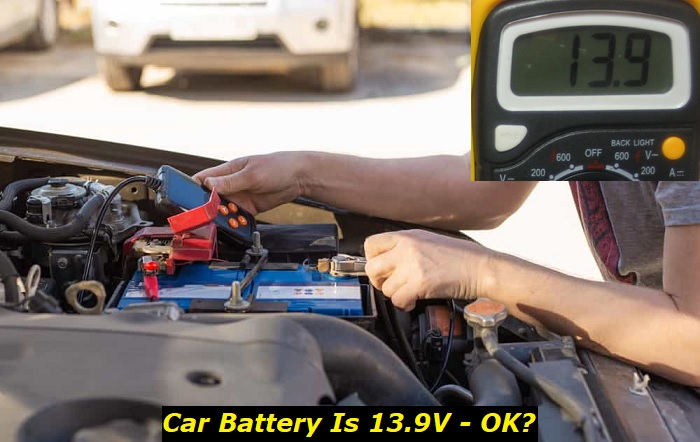Battery voltage is often overlooked by most drivers out there and they are only concerned about it when it's too late and there's a problem. After all, many people think that as long as the battery has been replaced or if there's no warning light in the instrument cluster, everything is working fine, when in reality, things can be a bit different.
In this article, we're going to talk about the battery voltage, what can cause issues, how you can avoid them, how to fix them, and if a voltage of around 13.9V is good enough for your vehicle.
Car battery voltage highlights
- Optimal conditions:12.4 - 12.5 volts
- When charging:14.3 - 14.7 volts
- Alarming voltage:less than 12 volts
- Acceptable drop when loaded:up to 10.5 volts
- Fix for low voltage:charging or replacement
- DIY fix:possible
- How much to fix? $0 - $250

What can cause battery voltage issues?
As we've mentioned above, there are situations in which the problem isn't signaled by a warning light in the instrument cluster and that's why you should pay attention to other important aspects. Here are a few things that could cause battery voltage issues:
1) Loose/corroded connections
Over time, because of all sorts of vibrations, the battery connections might become loose and this should be one of the first things you check. Also, sometimes, batteries are exposed to humidity and that might cause corrosion to their connections, so check for any signs of corrosion as well.
2) Bad grounds
Bad ground will cause all sorts of electrical issues, including a low battery voltage. We would advise you to check all of the grounds of the vehicle and clean them if you can. Even if this doesn't solve your problem, it's still good practice to check them from time to time, especially if the car in question is a little bit older.
3) Old battery
An old battery will almost certainly cause issues and no matter how much it is being charged, it will still not hold the voltage it used to when it was new. If you can't remember when was the last time the battery in your car has been replaced, it might just be the time to think about replacing it.
4) Parasitic drain
These are some of the most annoying electrical issues one can encounter in their vehicle because they usually take quite a lot of time to troubleshoot. What basically happens is that certain electrical equipment in your vehicle still has current flowing through it, even when the engine is turned off, which causes the voltage of the battery to go down, especially if this has been happening the entire night.
5) Auxiliary belt slipping
If the belt is slipping, that means that the car's alternator won't be working as it should, in which case there won't be enough charge for your battery. One way you can tell if the belt is slipping is if there's a screeching noise coming from under the hood of the vehicle.
Usually, belts are replaced every 4-5 years or after a certain number of miles, so if you don't have any record of the auxiliary belt ever being replaced, it might be a good time to do so, since it's a vital engine component and they are quite cheap and easy to replace. While in there, remember to check the belt tensioner as well, since it might cause issues too.
6) Faulty voltage regulator
There are situations in which the alternator itself is still good, but it's the voltage regulator that's causing the issue. We would definitely advise you to check the voltage regulator first since it's usually a lot cheaper to replace than an entire alternator.
7) Faulty alternator
If you are a little bit unlucky, then the alternator might be the actual cause of your battery voltage issues. Depending on the models, they can become quite expensive, so be sure to check everything else before spending your money on a brand-new alternator.
How to avoid battery voltage problems?
Avoiding issues basically consists in performing regular vehicle maintenance, such as replacing the battery and auxiliary belt when necessary and making sure that you drive it often enough so that the battery doesn't become discharged after sitting for too much time.
Remember to check the voltage from time to time, since it's much better to discover that you have an issue before it leaves you stranded in the middle of nowhere.
Apart from regular maintenance, it would be a good idea to check all the visible electrical connections from time to time, especially the positive and negative cables that run straight to the battery.
Another good idea to avoid battery voltage issues would be to avoid installing questionable aftermarket electrical equipment that doesn't have any kind of approval for your vehicle. They are many times the source of all sorts of electrical issues, especially battery drains. Some of the worst ones can even cause fires, so we would advise you to do your research before installing anything aftermarket.
How to fix the issues?
In order to fix battery voltage issues, you must first find the actual cause of the problem. Is the voltage too low? Is it too high? The normal operating voltage should be mentioned in a service book specific to your vehicle, so you should have no problem finding the right values.
If the connections or grounds are a little bit corroded, simply cleaning them with a piece of sandpaper will usually fix the problem. This is something that can be done by pretty much any amateur at home and it doesn't require any special tools either.
When it comes to detecting a parasitic drain, things become a little bit more complicated. Keep in mind that this will usually take quite a lot of your time, so we would only advise you to troubleshoot this kind of issue only if you are patient enough to do so.
Also, it would be a good idea to only start checking such problems if you know a thing or two about the vehicle's electrical system and if you know how to use a multimeter.
Replacing belts and tensioners shouldn't be too difficult, especially with a service book and the right tools at hand, but if you don't like getting your hands dirty, don't worry, since any of the local shops can do these things for you. The same thing goes for the alternator, it's easy usually not a big deal (depending on its location!) to replace, but any mechanic out there should be able to do it for you.
If we're talking about faulty alternators, the good news is that you don't always have to buy a brand-new one from the dealer. There are specialized shops that can refurbish alternators, only replacing the components that are actually faulty. They will also test them for you and will usually give you a warranty. This is usually a more affordable way of fixing the problem, but it really does depend on the actual state of the alternator.
Another thing you should keep in mind is that if you decide to take your vehicle to an electrician and it turns out that there's a wiring issue, while the actual fix might be very simple, the troubleshooting itself can take a lot of time and since most of the specialists charge you by hours worked, you can expect the bill to be quite expensive.
Is 13.9V battery voltage good?
Going back to the main question, the answer is rather simple: it depends. Since cars are very different, the correct operating voltages will be very different as well. Usually, operating voltages are around 13.5V to 14.5V, but it's not the case for every vehicle to have the exact same values.
We would advise you to check specific repair manuals before starting any kind of troubleshooting since many times the voltage might be right where it should be, even though you might think that it's either too low or too high.
Also, remember that there are a few different values that should be taken into account, such as the battery voltage with the engine turned off, with the engine turned on, with or without all of the electrical consumers turned on, or when the engine is revved to certain RPM.
Final thoughts
Battery voltage is definitely not something that should be overlooked, even though most people only realize how important it is when it's too late.
Don't be afraid to check the voltage from time to time and make sure to always perform the services that the manufacturer requires that you do regularly, since they will usually be more than enough to keep the car running just fine for a long period of time.
About the authors
The CarAraC research team is composed of seasoned auto mechanics and automotive industry professionals, including individuals with advanced degrees and certifications in their field. Our team members boast prestigious credentials, reflecting their extensive knowledge and skills. These qualifications include: IMI: Institute of the Motor Industry, ASE-Certified Master Automobile Technicians; Coventry University, Graduate of MA in Automotive Journalism; Politecnico di Torino, Italy, MS Automotive Engineering; Ss. Cyril and Methodius University in Skopje, Mechanical University in Skopje; TOC Automotive College; DHA Suffa University, Department of Mechanical Engineering






Add comment